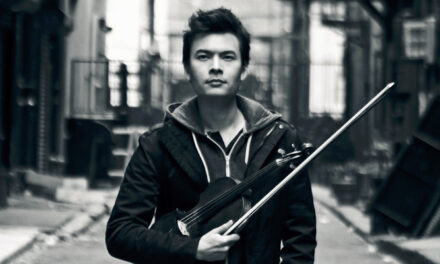Charleston has its several early-summer festivals, cursory commentary on which we are gradually completing elsewhere at this site, and Greensboro’s Eastern Music Festival, which we’ve covered more extensively, recently ended – the indefatigable William Thomas Walker’s reviews of the rest of those events will be posted here soon. In the Triangle, the midsummer doldrums have gripped the classical scene, but there are occasional twitches that give positive signs of life.
An outstanding example of creative programming presented by highly talented local artists occurred on August 2 in Carswell Recital Hall, where pianists Kent Lyman and James Clyburn, who represent, as it were, the new guard and the old guard at Meredith College, offered works for two pianos and piano four hands at a kick-off event for a weekend piano pedagogy workshop. The recital began with Schumann’s six Stücke in kanonischer Form, Op. 56; the formal title of this 1845 work is “Studien für den Pedal-Flügel,” from which it is clear that Schumann wrote it for the so-called pedal piano, a device that combined a standard piano with organ pedals. Since these things are as rare as hen’s teeth (and perhaps exist only in museums), the music is generally played in Debussy’s transcription for two pianos, although there have been other versions, including an 1888 “free arrangement” for piano trio by Theodore Kirchner that actually does better than Debussy in bringing out the pedal lines, which are often carried in the cello part. Lyman and Clyburn realized the score beautifully, delivering interpretations that were at once elegant, expressive, and well oiled.
Poulenc’s Sonata (1952-3) was written as a piano duet and was played that way, following an amusing introduction by Lyman, who gave an account of Charles Wadsworth’s explanation of what can happen when two people sit on the same narrow bench. The three-movement piece is light and gay and no more substantial than most of Poulenc’s other music that we’ve heard.
You’d think that any large-scale work by Dave Brubeck would be primarily jazz-oriented but “Points on Jazz” (begun 1958) has surprisingly many allusions to the classical world. (Brubeck’s oratorio Light in the Wilderness was first heard in Chapel Hill in the ’60s, so clearly he comes by his “serious” bent honestly.) The little jazz suite is an eight-part work based on a theme sketched as a tribute to the people of Poland that was later expanded for use by the American Ballet Theatre. It’s basically a theme with variations that are alternately seductive, charming, and profound but consistently appealing. Brubeck’s brother Howard is credited with the two-piano transcription, but the music is Dave B’s, and the performers made it their own.
The concert ended with a rollicking piano-duet transcription by Gregory Stone of Gershwin’s “I Got Rhythm.” The audience went away smiling, primed – no doubt – for what promised to be a stimulating weekend of lectures and seminars intended to recharge the batteries of the workshop’s participants before their students return in the fall.











